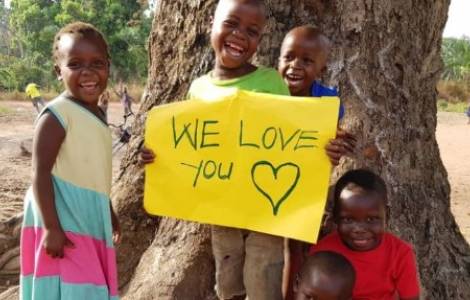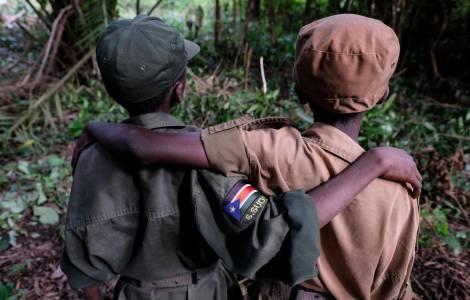
Tombura Yambio (Agenzia Fides) - "We firmly believe in education as an instrument of peace. Even in South Sudan, to manage the transition from arms to dialogue, it is necessary to invest in schools, which is essential for the growth of a country battered by years of conflict", says the Italian Comboni missionary, Sister Laura Gemignani, who has been active in different African countries for more than 40 years.
The nun currently lives and works in Kanawat in the Diocese of Kotido in the Karamoja region, a 10-hour drive from Kampala. She has been working in South Sudan since July 2012 and has followed developments there at close range. During the years she spent in Yambio, a suffragan of the Archdiocese of Juba, she had come into contact with the residents, whom she describes as "quiet and peaceful people who belong to the Azande Kingdom and who, although politically not relevant, have always conveyed a sense of unity and cohesion". The last king of the Azande, Azande Atoroba Peni Gbudue, was installed in Yambio on February 9, 2022. "Also due to the ongoing tribal conflicts, priests and bishops face enormous difficulties in carrying out their mission in the service of the Gospel. In some cases, hostilities between different ethnic groups are reflected in hostile attitudes towards church officials. Also in order to overcome these problems, many priests and the bishop, Eduardo Hiiboro Kussala, have been very committed to education in Yambio by opening schools that offer many children the opportunity to learn," reports the religious on the situation on site .
A total of 35 Comboni Missionary Sisters have been in the country since the end of the war. They have opened a health center, a primary school and most recently a secondary school, as well as a community center which they have handed over to the diocese. "The health center, the General Hospital Saint Therese in Nzara, 30 km from Yambio, is now a real hospital," says Sister Laura, "with a department for the treatment of HIV patients. Under the so-called Rainbow Program, 2,700 people are being treated there. Today there are 160 healthcare workers and the hospital has an operating room, laboratories, a maternity ward, a pediatric clinic and a general medicine department. We have also set up emergency rooms where doctors can intervene and a clinic for the treatment of Tuberculosis and leprosy patients.” In this context, Sister Laura emphasizes the charisma of the Comboni missionaries: "Working with the poor is our privilege because it gives us the opportunity to touch the flesh of Christ.”
Despite a peace agreement signed in 2018, a number of local conflicts persist in South Sudan. According to observers, the current violence between Nuer and Shilluk militias in Upper Nile State is one of the most dangerous conflicts. Thousands of people have been uprooted since mid-November 2022 and fears of an impending attack in Kodok, a town home to more than 10,000 displaced shilluk, have been raised. The clashes were sparked by tensions within a splinter group of the country's main opposition movement, the Sudan People's Liberation Army Opposition (SPLA-IO). President Salva Kiir has said he "cannot stop the fighting," while analysts say it is precisely by putting different sections of the population against one another that his power will be maintained and strengthened.
In his words of greeting after the Angelus on Sunday, December 11, Pope Francis expressed his closeness to the suffering of the people of South Sudan, the country to which he will travel in early February. The Pope expressed concern about the violence that is raging, especially in the state of Upper Nile, and is driving thousands of people to flee.
South Sudan's independence was proclaimed on July 9, 2011. Salva Kiir, a member of the Dinka ethnic group, was appointed the first president and appointed Riek Machar, of the Nuer people, as his deputy. But not even three years later a new civil war broke out. In 2013, Machar, who was aspiring to the presidency, was removed from office, and great instability and tensions re-emerged. After many failed negotiations, Kiir finally reappointed the still-exiled Machar as vice president. Machar returns to Juba on April 26, 2016 to sign the peace accord that was signed in Ethiopia in August 2015 and has not come into force since. Despite initial progress in the implementation of the peace agreement leading to the formation of an interim government of national unity in February 2020 and the reopening
of Parliament in May 2021, the balance in South Sudan remains extremely precarious. Actually, elections were supposed to take place in 2022, but on August 4, Salva Kiir and Riek Machar mutually extended the transition period by two years. Elections scheduled for February 2023 have been postponed to early 2025, leaving the interim government formed in February 2020 in power. (LG/AP) (Agenzia Fides, 13/12/2022)
